Abida Rasheed and I quickly discover that we share twin passions for food and traditional Indian textiles. She comments appreciatively on the fabric I’m wearing, and unerringly names the printer whose work we both admire. As we stand in the busy kitchen at Karavalli, exchanging introductions, I glance at the array of vessels stacked behind her – earthen chattis of every size and description, bamboo puttu steamers, and copper biryani vessels – and I know immediately the afternoon ahead will be one to hoard among my cherished culinary experiences.
Abida follows my gaze, and declares that she never travels without her own vessels, when she conducts cookery sessions for chefs. ” These are Pallakad chattis,” she says, “made from the deep red mud of the region. It is unique, sealing in the flavours of the food, and imparting it’s own, subtle chemistry to the taste of a dish.” When I taste the food later, I understand why she speaks so passionately about mud. The chattis have worked an alchemy; the food is infused with rounded flavours, as if it has met with no resistance within the interiors of the mud pot and yet, there is an additional depth that enhances the curry. ” We season them with burnt paddy husk or kanji, and food can be stored in them without spoiling for upto three days. There is no risk of unpleasant reactions,” adds Abida.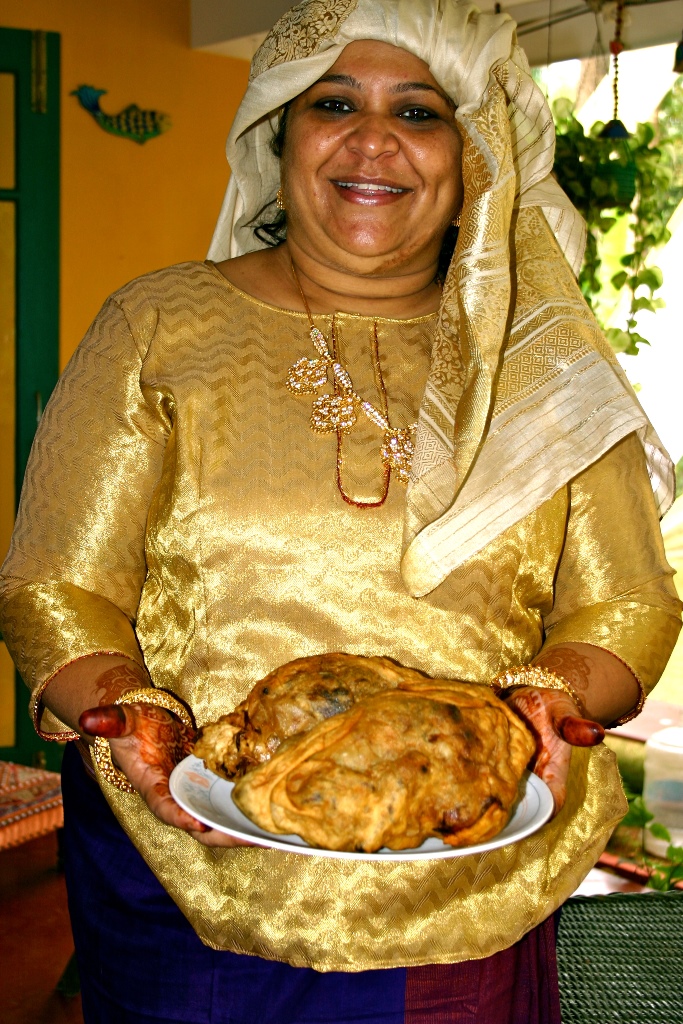
Voluble and cosmopolitan, Abida traces her ancestry to Yemeni merchants, who, along with many other people from the Arabian Peninsula, have an ancient history of trade and intermarriage with the people of the Malabar Coast. The Arabs, who controlled the spice trade for centuries, plying their dhows on the monsoon winds, purveyors of expensive, exotic ingredients to the West via the Red Sea and the Mediterranean, settled along the Malabar coast, marrying local women, creating a distinct, hybrid culture – Mappila.
When Vasco da Gama landed in Kozhikode, Abida’s hometown, his entourage was greeted by men speaking in Castilian; the Portuguese were dazed by the wealth of the city, where Arab merchants lived in sprawling mansions, and controlled the sea trade across the Indian Ocean. The Mappilas – also spelt Moplah – descended from these traders, evolved an exotic style of cooking, inherited from their sea faring ancestors, while embracing deep influences from the fertile land where they settled.
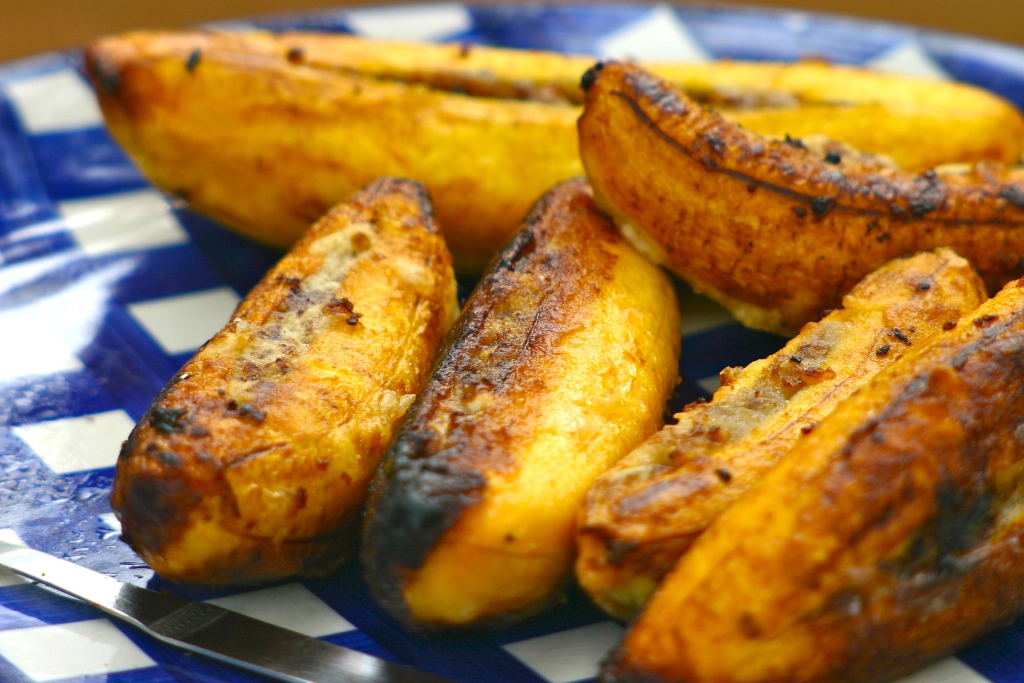
The Mappilas follow the matrilineal traditions of Malabar – “We don’t give away our daughters,” says Abida, smilingly, – so a son-in-law is introduced to culinary traditions that his wife has inherited through an unbroken chain of female ancestors. And this is an elaborate cuisine, inspired by all the leisure and riches the spice trade commanded, where wheat has been largely replaced with the more readily available rice, and coconuts, palm jaggery and local spices incorporated into a heavily meat based diet. While the flavours are rich, the use of spices is surprisingly spare: chilli powder, turmeric, very small quantities of coriander powder, green chillies, ginger, and garlic. These simple combinations, with tomatoes and coconut oil as the base, are what make you wonder whether you really lived before you tasted chemeen porichattu (marinated prawn fry) ari kadaku (shallow fried mussels stuffed with rice powder and spices) koondal kadaku phokuvadu (masala squid and mussels).
Abida is one of a rare breed of women trying to resist the dismal standardization of food in this country, by striving to preserve her distinctive culinary heritage. In addition to running a store dedicated to traditional Indian textiles, she holds cookery courses in her wood fired kitchen in Kozhikode, which are very popular with expatriates and tourists, and she travels around the country training chefs to understand Mappila food.
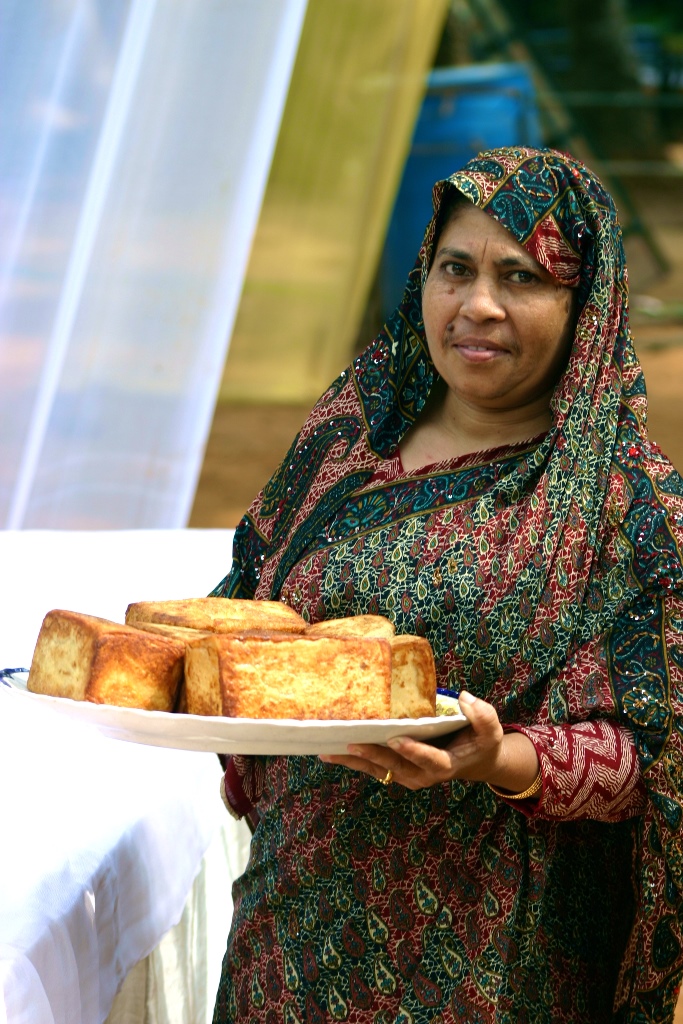
One has to imagine vast mansions, monuments to a thriving spice trade, filled with several generations of a family and experienced cooks, to appreciate the typically expansive Mappila menus. The day is a parade of extravagant dishes, beginning with a substantial breakfast or brunch, which Abida describes with gusto – pathiris, or rice puttus with goat’s head curry; liver fry, and delicious cheena chatti cakes. A trail of snacks – samosas, ghee-roasted Malabar plantains, unnakai (sugared scrambled eggs, or coconut, stuffed in banana and fried) – leads to a sumptuous lunch of red fish curry, or fried fish and rice, and a sweet and sour mango curry. The famous neichor, a silky, lightly sweetened ghee rice full of raisins and cashew nuts is usually reserved for a Friday special.
Abida is a purist in many respects. She cooks the traditional Mappila biryani in copper pots, sealed with atta, and brings them to the table to release a fragrant cloud of steam, an integral experience of savouring a biryani, lost when one empties the pot onto a platter before transferring to the table. She used to gather wild roses from fields to make rose water to sprinkle over the rice, but has recently succumbed to sourcing it from Delhi. Subtly spiced, the Mappila biryani is quite different from its Northern versions and, is traditionally followed by aleesa – meat pounded with wheat, cooked with onion, coconut milk and sugar, a strong throwback to their Arab ancestry. Pathiris – unleavened rotis made of rice – are eaten with mutton or fish curry or, they encase fillings of fish or meat, steamed between banana leaves into a delectable, one –meal dish.
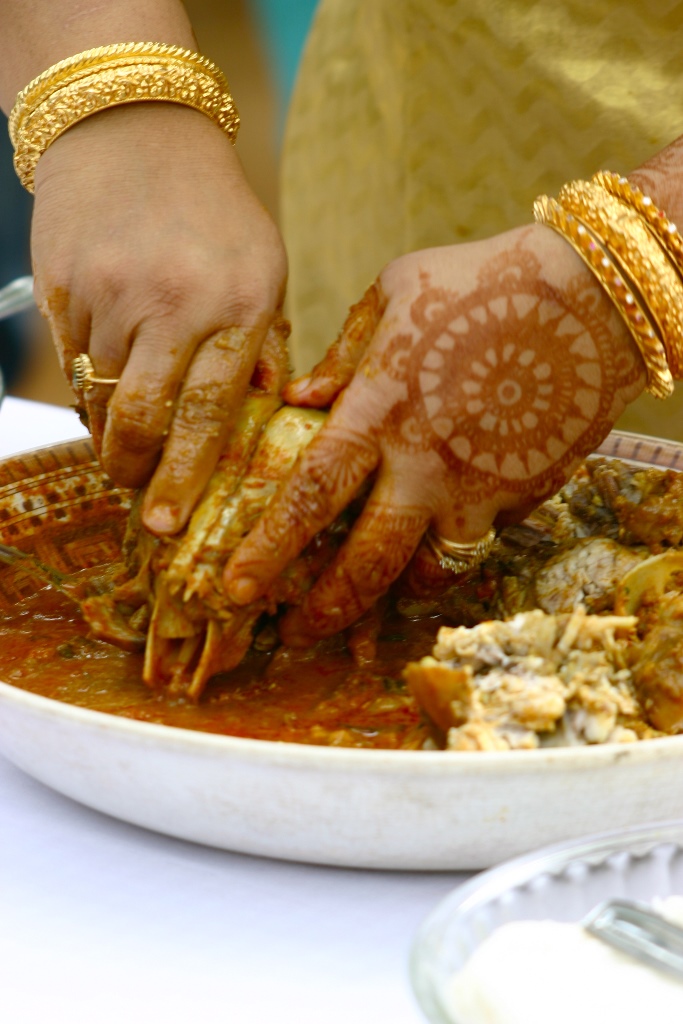
Over the centuries, distinctive styles of Mappila cooking developed in pockets. Thalassery (Tellicherry), unanimously voted as possessing the best tradition, is Abida’s mother’s home – and Kannur, (Cannanore), where her husband belongs have similar cooking styles, while Kozhikode (Calicut), where Abida lives, has a style all its own. Abida is the fortunate inheritor of all three. Many Mappila dishes are exotic works of art, requiring several hours of preparation, like kozhi thalakanni (pillow chicken), a recipe several centuries old. A country chicken – more specifically, a cockerel – is carefully skinned, its flesh minced and cooked with a thick, spiced gravy of onion, ginger, garlic and tomato, and then stuffed back into the skin, sealed between two large discs of dough and deep fried. When done, this exquisite preparation should be crisp on the outside, with a succulent filling. The art lies in keeping the skin from splitting or tearing.
This is an old and intricate cuisine and, while some of the dishes can be successfully adapted to a modern kitchen, I prefer to catch my favourites at Karavalli, where Abida has spent hours sharing her knowledge with Naren Thimmaiah and his team of chefs. Eating with Abida – and that is exactly what the experience is, food from her kitchen, not a restaurant – is a lesson in appreciating the finer points of a Mappila meal. She chats about every dish, throwing in bits of history, urging you to try the mussels, dashing into the kitchen to hector the chefs into serving the biryani just right, with the accompaniments in the correct order.
Some months later, compelled by this extraordinary tradition and a generous invitation form Abida, we find ourselves attending her daughter’s wedding in Kozhikode, at the spacious Rasheed home. A back garden slopes down to the riverside, a setting worthy of a film – sheltered by coconut palms and jackfruit trees, long, narrow tables set end to end, stretch over 70 feet. The family has been at work since dawn and, as we watch, a parade of dishes passes before our eyes – this is the wedding brunch to welcome the son-in-law. Everything is home cooked, and Abida’s husband, Mohammed Rasheed, who supports all her endeavours, sums up generations of Mappila hospitality feelingly: “If you cannot cook for your guests, don’t invite them home.”
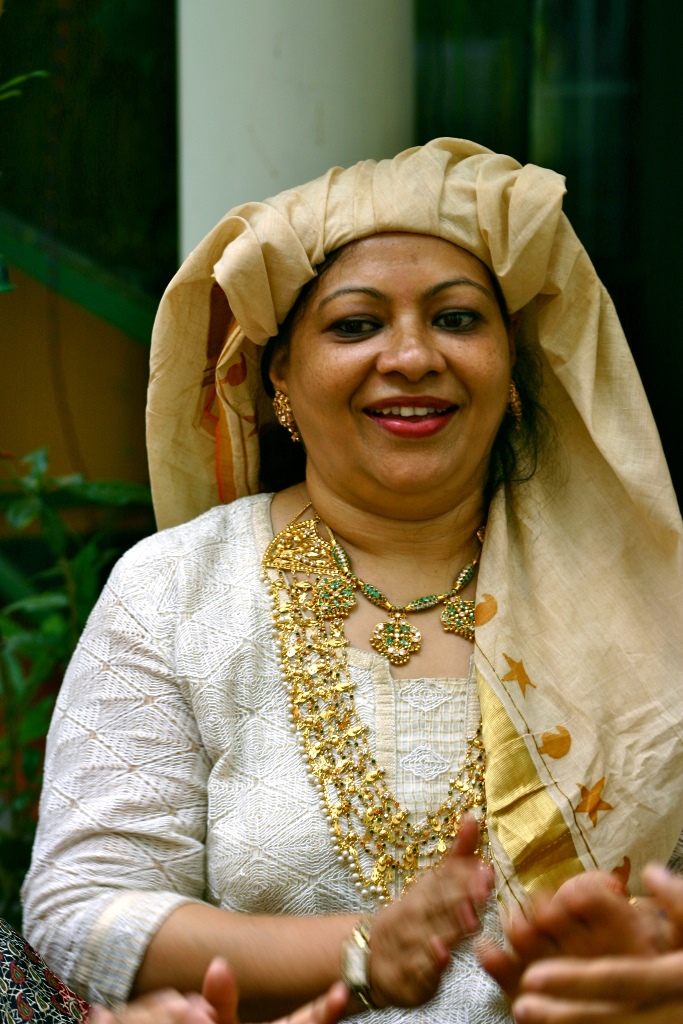
Seventy or more baked, steamed, stuffed, fried, roasted and curried dishes are carried in. The breads alone include thirila rotis, (steamed rice cakes stuffed with prawns), erachi pathiri, oottu pathiri, kakka rotis, (tiny, steamed rice dumplings cooked in a beef gravy). They range from paper thin, plain ones, to enormous, puffed, deep fried versions, stuffed with delectable seafood or meat. The morning’s catch is worked into an entire menu of seafood dishes: chemeen ada (prawn curry); njandu curry (crab curry) both cooked in earthen pots; meen vevichath (fish curry); kadukka fry. There is chicken, several times over – curried, stuffed, and fried; goat’s head curry; gigantic beef kebabs. Every flavour astonishes with its distinctiveness, achieved with a subtle manipulation of freshly prepared spices.
A platter of miniature loaves, golden brown, catches my eye. A swipe of a knife blade, and a filling of egg, and meat cooked in masala spills out. Rotti nirachatu is made by slicing the top of a loaf not quite off, excavating the inside, filling it, replacing the top, sealing it with dough, dipping in egg and frying the loaf whole. A little way down the table, Abida breaks the kozhi thalakanni, so that guests, intimidated by its perfection, will not hesitate to tuck in.
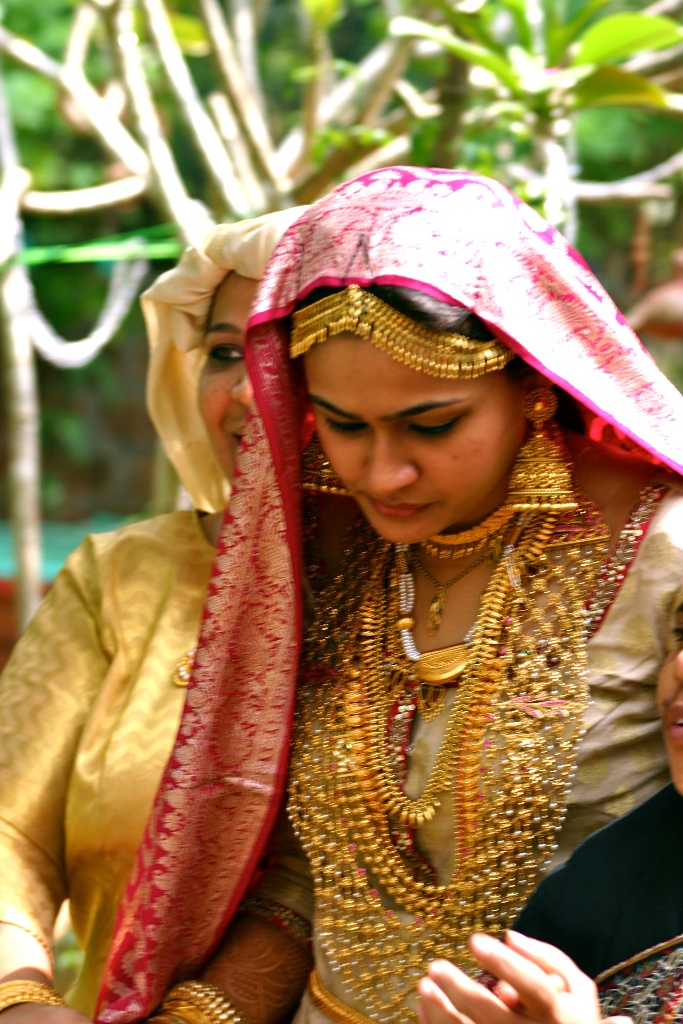
By the time the lovely young Mappila bride arrives, escorted by her singing, clapping female relatives, we have already worked our way through the impossibly airy mutta mala – a dessert of egg yolks, dripped through a perforation in a coconut shell, or sev press, into boiling sugar syrup, which sets into a delicate garland of loops. Lifting it out of the hot syrup without breaking the strands requires a lightness of touch, a test that many fail. The bride’s uncle urges me to try the paal vayakka, a sago payasam, exquisitely flavoured with Kerala bananas. I mull over the cheena chatti, a yielding, delicious, layered, cake-like sweet, made with eggs, baked in an earthen pot. Not one dessert is overburdened with excessive sugar, so other flavours can express themselves to perfection. This is a luxurious banquet, threaded through with the tangible warmth and hospitality of Abida’s extended family.
In the over five hundred recipes she has collected over the years, Abida holds a piece of culinary history, a record of migrations and food lore, which is any food historian’s dream, too precious to be lost. It is a real privilege to know her.
Trading Flavours appeared in Food Lovers Magazine, Bangalore, February-March 2011.
Image Credits: K.P.Ponnapa

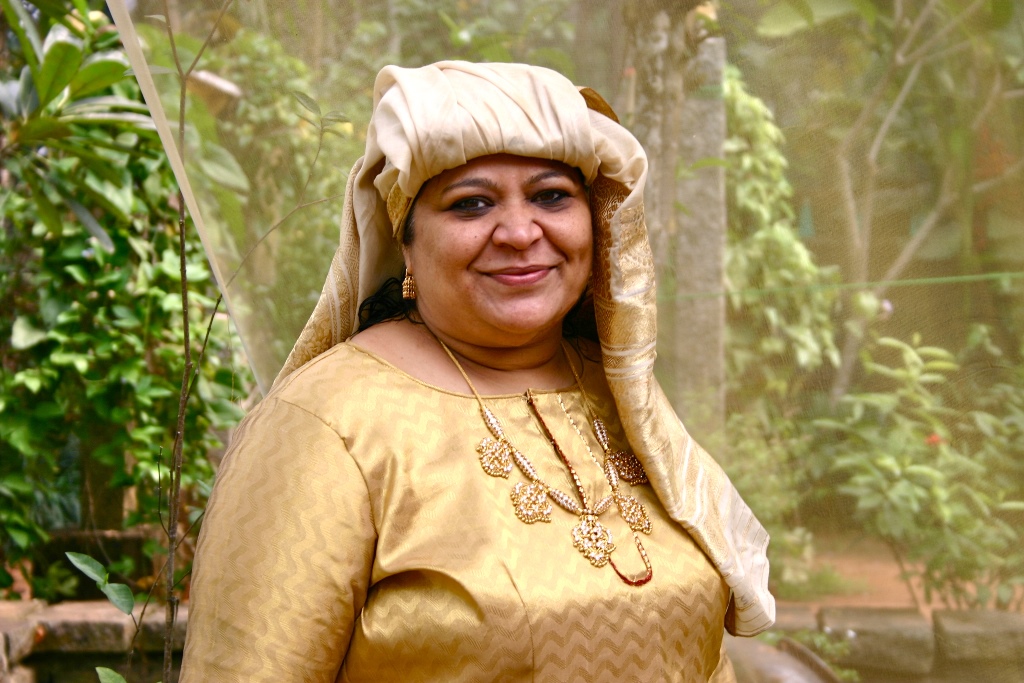
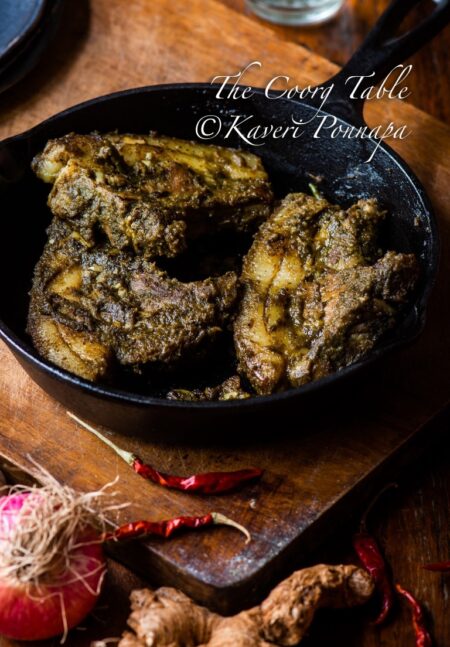
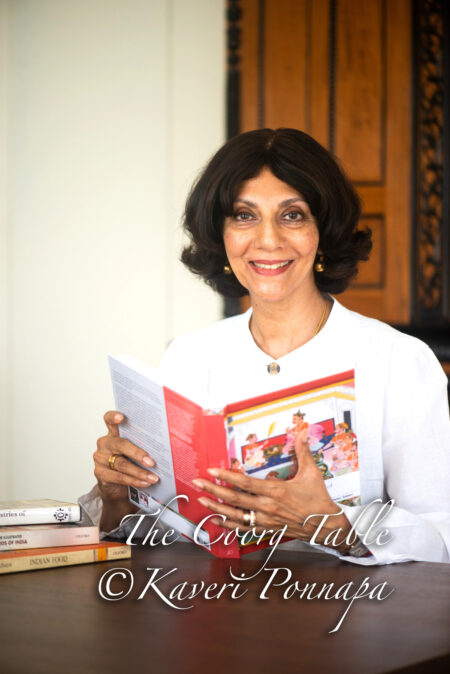
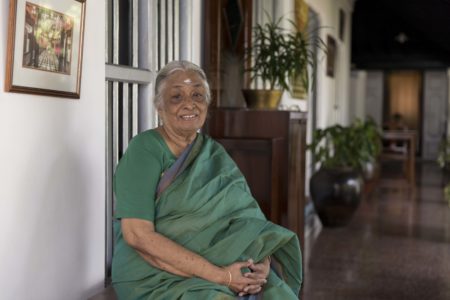
Hi Kaveri
I chanced upon your blog and loved it! I am from Kerala but never lived there. As i am getting older, i realize that i miss all the naadan food..It was interesting to read about Abida and Mappila food.
Hi Swapna, I’m really happy that you enjoyed this article. Abida’s daughter’s wedding was extraordinary, the food was like nothing that I had tasted before, full of unusual flavours.There was an enormous spread, so I doubt if we could have got a better introduction to the cuisine. Do keep reading these pages, and if you are interested in other cuisines, do read The Coorg Table. Best wishes. Kaveri
Dear Kaveri
I did visit Kozikode Kalikat Baliyapattam in 1970 We had Timber business We used to stay in Mopalahs homes I used to enjoy their food Your beautiful artical took me in my old memories I did learn these recipes God bless you !
Hello Jaya, thank you for sharing your memories. The Mapillas have some wonderful food,and they are very hospitable people- you must have enjoyed your time with them. I’m sure that you still make those dishes for friends, and for yourself. I’m so glad you liked the article, thanks for your appreciation. Warm wishes.Kaveri
Dear Kaveri,
I was so delighted the words which explained each and every delicacies of the Malabar Coast. I will be following Abida Rasheed’s recipies. I just learnt about you today and I will be starting to try out the recipies. I love to try and have each delicacy on my own as well.
Thank you Kaveri.
Hello Maureen, thank you for writing in. I’m delighted that you enjoyed reading about Abida, and the Mappila food she cooks.
The recipes on this blog, The Coorg Table are all authentic Coorg recipes, passed down in my family, my husband’s family, and some of them from special Coorg friends. They are what I cook regularly for my own family and friends. Do try them out, and I am sure you will love them as much as we all do. I would be very happy to hear from you again, and answer any questIons that you may have – and also, which dishes you liked the most! Best wishes. Kaveri.